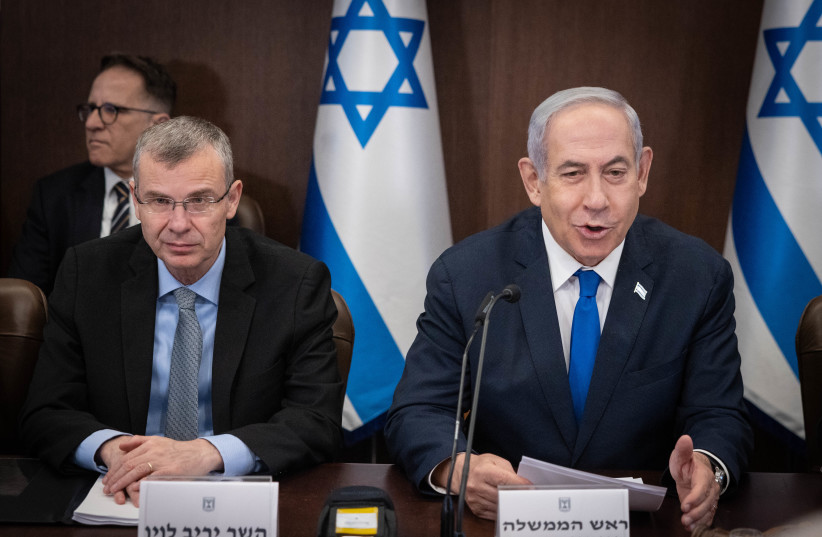When the Gaza war is over, Israel will be facing countless “what if” questions.
What if the IDF had more forces on October 7 along the border? What if Military Intelligence had paid more attention to Hamas maneuvers on the other side of the security barrier? What if Israel had not allowed Qatar to prop Hamas up with cash that was used to build a sophisticated army?
Here is another one of those "what if" questions: What if Justice Minister Yariv Levin had said in July what his private lawyer wrote to the High Court of Justice on Monday—that he intends to convene the Judicial Selection Committee within 15 days?
Levin's brief to the court came as the court was poised to hear petitions next Sunday requesting that it force the Justice Minister to convene the Judicial Selection Committee, something he has adamantly refused to do since he unveiled his judicial reform plan in January.
Levin's reform plan—a plan that launched thousands of protests and cleaved a nation—included changes in how the country's judges, from magistrate's judges to the president of the Supreme Court, are selected. Levin wanted to change the composition of the nine-member committee to give the government more sway in selecting the judges.

"In order to avoid dispute, the minister will convene the Judicial Selection Committee within 15 days, and commits at this time to bringing before the committee decisions over which there is broad agreement," Levin's brief statement to the court concluded. The first part of the statement said that Levin believes that "war is not the time to deal with issues in dispute, including the process of appointing judges."
Wow.
Had he said in July that he would convene the Judicial Selection Committee to avoid disputes, then months of division might have been avoided. That is not to say that there would not have been protests and internal strife, but it might not have reached the level where Israelis were at each other’s throats -- one of the reasons, perhaps, that Hamas decided that now was precisely the time to strike.
It takes a war to put things in perspective.
Had Israel not been at war right now, and had Levin written what he wrote to the court about deciding to convene the judicial selections committee to avoid disputes, it would have been the major news story of the day, if not the week and month. Why? Because the process of selecting the judges was one of the issues at the heart of the judicial reform that Levin proposed and which split the country.
Remember the Law to Cancel the Reasonableness Standard in the Knesset, a law that passed the Knesset at the end of July, whose legality was argued before the High Court in September, and which at the time seemed to be the most important matter in the world? Well, the question of the Judicial Selection Committee was even more critical to the judicial overhaul plan than the reasonableness standard.
In June, for instance, the nation's attention was riveted on whom the Knesset would select as its representative to the nine-person Judicial Selection Committee: would it be two coalition members or one coalition and one opposition MK, as has traditionally been the case in the past?
A world war was waged over the two MKs, and due to the coalition's failure to appoint its representative—an opposition MK was selected—negotiations over the judicial overhaul plan, negotiations designed to keep Israel from teetering on the brink of domestic chaos, were suspended, and the intensity of the demonstrations on the street picked up.
This is what followed: IAF reserve pilots threatened not to show up for reserve duty; "Days of Disruption" were declared; roads were blocked; there were calls for a general strike; high-tech money streamed out of the country; the shekel collapsed; hateful rhetoric became the norm; there was talk of civil war.
A lot of strife may have been avoided
Had Levin said months ago what he said in November, much of that—though by no means all of it— might have been avoided. Such a statement months earlier would have severely watered down the judicial overhaul plan and taken much of the air out of the protests that swept the country -- and that would have been major news.
On Tuesday, however, the story about Levin's willingness to convene the committee was relegated to page 23 in Yediot Ahronot. In Ma'ariv, moreover, the story did not even merit its own headline, buried at the very end of a page two story on a related issue.
Why? Because during wartime, things that seemed so important a few weeks ago seem rather inconsequential now.
National Unity Party Minister Benny Gantz, now part of the emergency war government, applauded Levin for deciding to convene the committee, saying it was "a correct and statesmanlike decision" and the "right step for this time."
What a shame that such a “correct and statesmanlike” decision was made only now. What if it had been made a few months earlier.
What if?
